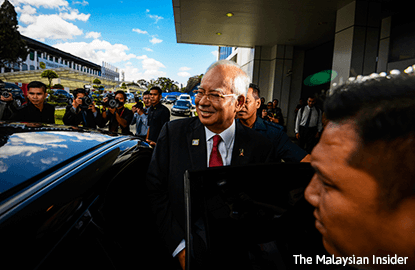
KUALA LUMPUR (Jan 27): Prime Minister Datuk Seri Najib Razak may have stayed on the right side of the law over his RM2.6 billion donation but he is unlikely to win over the court of public opinion, political analysts said, as his exoneration is tainted with signs of political interference.

Attorney-General Tan Sri Mohamed Apandi Ali's (pic) announcement that Najib was free of criminal wrongdoing in receiving funds to his private bank accounts and over a RM4 billion loan to Finance Ministry-owned SRC International Sdn Bhd will not help the prime minister regain public trust, they said.
Further, the A-G's explanation yesterday that Najib had returned the money given to him before the 13th general election in May 2013, does not add up as US$61 million has still not been accounted for, one analyst, Dr Lim Teck Ghee said.
The trust deficit would also likely carry on till the next general election slated in 2018 but by then it could also be a non-issue due to the short memories of Malaysian voters, analysts added.
Incredulity and interference
One of the main problems with making sense of the two scandals, especially the RM2.6 billion donation, was how "unbelievable" it all was from the very beginning, political scientist Dr James Chin (pic), of Tasmania University in Australia, said.

The incredulity stems from how the Najib administration responded to the allegation that RM2.6 billion flowed into Najib’s personal bank accounts.
“The majority of the people don’t believe how anyone could have given him RM2.6 billion. (If it were RM2.6 million) we can still give him the benefit of the doubt, but who in their right mind would just donate RM2.6 billion?” Chin told The Malaysian Insider.
Explanations on the matter, coming in dribs and drabs since Najib refused to give a public explanation in Parliament, also added to public distrust.
The Malaysian Anti-Corruption Commission (MACC) had confirmed on Aug 3 that the money was a political donation from the Middle East.
But this admission was only made almost one month after The Wall Street Journal first reported on July 2 last year about the flow of funds into Najib's personal accounts.
The WSJ's report was based on documents leaked by Malaysian investigators probing Najib's brainchild, state-owned investment firm 1Malaysia Development Bhd (1MDB).
And only yesterday — six months down the road — Apandi identified the donor as "the Saudi royal family" and said that Najib had returned US$620 million, out of the US$681 million given, in August 2013.
This raises the question of where US$61 million had gone to.
“It is difficult to accept this or any other explanation. The whole story does not make sense. Neither do the details add up,” Lim said.
Even if people were to buy Apandi’s explanation, there is still the question as to whether Malaysians would be comfortable with a foreign power being involved in domestic politics, he added.
Another main problem was the credibility of the investigation itself.
The high-powered taskforce investigating this scandal was disbanded, the former attorney-general and the well-regarded Public Accounts Committee (PAC) was defanged just as their probes were in high gear.
Worse still, MACC officers were transferred and investigated by police supposedly for leaking information. These transfers were later rescinded due to public pressure.
“We have had so many unanswered questions, as well as attempts to kill off the investigation rather than prompt the full disclosure right from the beginning.
“The public will view the A-G's decision as another cover up effort," Lim said.
Will voters remember?
Last night, hours after Apandi's announcement, Najib called the whole saga an "unnecessary distraction" and urged Malaysians to "move on".
This leads to the ultimate question – whether the trust deficit will in the end, sink him and the ruling Barisan Nasional in 2018.
Tasmania University’s Chin does not believe that the trust deficit will lead to political consequences nor will it affect support for the ruling coalition in the next general election.
“If Najib can clear away these legal allegations and shut down 1MDB, all these scandals would be a non-issue by 2018,” Chin said.

Lim agrees that the public has a short term memory but argued that support among the urban electorate was still lost.
Wan Saiful Wan Jan (pic) of the Institute for Democracy and Economic Affairs (Ideas) thinks the public's short-term memory is arguable as the issue cannot be so easily pushed away.
This is because if Najib admitted getting RM2.6 billion in donations in 2013, the question in 2018 will be how much he received for the 14th general election, said Wan Saiful.
“This decision (by the AG) is a no-win situation for Najib. The case may be closed but to the public, it is not.”